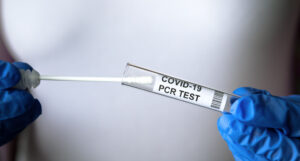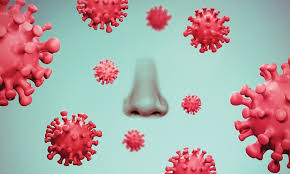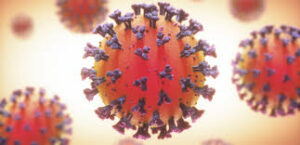Amrywiad Sigma – arwyddion pryderus o amrywiad newydd sy'n dod i'r amlwg o bryder gan Sefydliad Iechyd y Byd yr ymddengys ei fod yn osgoi amddiffyniad brechlyn.
Amrywiad Omicron – Covid 19 Amrywiad Newydd o Bryder
Amrywiad Omicron – This variant has a large number of mutations, some of which are “concerning” stated the World Health Organisation (WHO).
Preliminary evidence suggests an increased risk of reinfection with this variant, as compared to other Amrywiadau Covid.
The number of cases of this variant appears to be increasing in almost all provinces in South Africa where it was originally identified.
The B.1.1.529 variant was first reported to WHO from South Africa on 24 Tachwedd 2021.
The sudden emergence of a new variant – named omicron by the World Health Organisation (WHO) – has provoked memories back to last winter, when the world was first informed of a new, more transmissible form of the virus, the Delta variant.
Mae'r prif straen Covid-19 wedi rhoi'r ffocws yn ôl ar atal
1. Omicron is more infectious than the other virus strains.
2. Mae pobl heb eu brechu mewn perygl.
3. The Omicron variant could lead to ‘hyperlocal outbreaks.’
4. There is still more to learn about this Variant.
5. Vaccination is the best protection against the emerging Covid variants
Profion Preifat Covid-19 PCR Ffit Teithio Plu Dramor
Fit to Fly Test London – PCR tests are being offered by many London Harley Street clinics and medical providers for Covid 19.
Many Harley St Clinics offer Test to Release & PCR tests with a ‘Fit to Fly’ Certificate for international travel and work, with rapid and accurate results.
The tests are normally an in-clinic test that is carried out by a clinician.
If you are intending to travel for leisure, work or educational purposes, then you need a test.
Once the test has been completed and the results are confirmed, you will receive the relevant certificate and a QR code confirming your travel fitness status.

There are different tests you can get to check if you have coronavirus (COVID-19). The test you need depends on why you’re getting tested.
Mae'r 2 main tests are:
- PCR – mainly for people with symptoms, they’re sent to a lab to be checked
- rapid lateral flow tests – only for people who do not have symptoms, they give a quick result using a device similar to a pregnancy test
What is a PCR test?
A polymerase chain reaction (PCR) test is performed to detect genetic material from a specific organism, such as a virus. The test detects the presence of a virus if you are infected at the time of the test. The test could also detect fragments of virus even after you are no longer infected.
What does PCR stand for?
Polymerase Chain Reaction (PCR)
How to do a PCR test at home
If you have symptoms of coronavirus (COVID-19) you should isolate immediately and book a PCR test with your nearest private Harley Street Clinic.
You may be able to get a PCR test to do at home, depending on availability
What’s in a PCR test kit?
Home test kits contain:
- a swab
- a vial containing a small amount of liquid – this must remain in the tube
- a clear zip-lock bag with an absorbent pad
- a bag with a QR code
- 3 stickers
- a box
Fit to fly Test London Travel Tests
Covid-19 travel tests are required if you are due to fly abroad. Typically these are Polymerase Chain Reaction (PCR) tests.
Please check the list of government approved testers.
How long will it take to get my COVID-19 Test results?
How much does a PCR Test Cost?
Costs vary but typically between £60 to £250 depending on the provider that you choose.
Covid Amrywiol ETA 19 Coronafeirws
Eta variant is highly contagious
Ym mis Medi 2021 bron 70% of UCL patients who tested positive for COVID-19 had the Eta variant.
Yn ôl yr UCL yn ystod yr un wythnos, Roedd yr amrywiad episilon yn cyfrif am fwy na 80% o achosion newydd yn yr Unol Daleithiau. Dywed arbenigwyr iechyd ei bod yn nodweddiadol i straen newydd o firws fod yn fwy heintus oherwydd ei fod yn aml yn dod yn llawer mwy effeithlon ac yn hawdd ei drosglwyddo.
Mewn cymunedau â chyfraddau brechu is, yn enwedig ardaloedd gwledig sydd â mynediad cyfyngedig i ofal, the Eta variant could be even more damaging. Mae hyn eisoes yn cael ei weld ledled y byd mewn gwledydd tlotach lle nad yw'r brechlyn COVID-19 mor hygyrch. Dywed arbenigwyr iechyd y gellid teimlo'r effaith am ddegawdau i ddod.
Mae'r prif straen Covid-19 wedi rhoi'r ffocws yn ôl ar atal.
O'r hyn rydyn ni'n ei wybod ar y pwynt hwn, Mae pobl sy'n cael eu brechu'n llawn yn erbyn y coronafirws yn parhau i gael amddiffyniad cryf yn erbyn Covid-19 o gymharu â'r rhai nad ydyn nhw, er bod yr UCL yn cynghori rhagofalon ychwanegol gan gynnwys canllawiau masg p'un a ydych chi wedi'ch brechu ai peidio.
“Achosion arloesol,”Lle mae pobl sydd wedi'u brechu'n llawn yn cael COVID-19, yn dal i gael eu hystyried yn brin, even with Eta, yn ôl yr UCL, ond os yw person wedi'i frechu wedi'i heintio, gallant drosglwyddo'r firws. (Mae'r UCL yn parhau i asesu data ynghylch a all pobl ag achosion arloesol nad oes ganddynt symptomau ledaenu'r firws.)
Here are five things you need to know about the Eta variant.
1. Eta is more contagious than the other virus strains.
2. Mae pobl heb eu brechu mewn perygl.
3. Eta could lead to ‘hyperlocal outbreaks.’
4. There is still more to learn about Eta Variant.
5. Vaccination is the best protection against Eta Variant.
The most important thing you can do to protect yourself from UCL is to get fully vaccinated, Dywed y meddygon. Ar y pwynt hwn, mae hynny'n golygu os ydych chi'n cael brechlyn dau ddos fel pfizer neu moderna, Er enghraifft, Rhaid i chi gael y ddwy ergyd ac yna aros y cyfnod pythefnos a argymhellir i'r ergydion hynny ddod i rym yn llawn.
Mae'n bwysig cofio hynny, tra bod y brechlynnau'n hynod effeithiol, nid ydynt yn darparu 100% hamddiffyniad, Felly wrth i fwy o bobl gael eu brechu, Efallai y bydd mwy o achosion arloesol, Dywed yr UCL. Er y bu i'r ysbytyau arloesol, Mae pob brechlyn yn dal i ddarparu'r amddiffyniad gorau rhag salwch difrifol, ysbyty a marwolaeth, Dywed yr asiantaeth.
Gall pobl sydd wedi'u brechu'n llawn heintio eraill, but the UCL also reports the amount of viral genetic material may decrease faster in vaccinated people from the Amrywiad Epsilon—so, Er y canfuwyd eu bod yn cario'r un faint o firws yn eu trwynau a'u gyddfau â phobl heb eu brechu, Mae astudiaethau hefyd wedi canfod y gallant ledaenu firws am lai o amser na'r rhai nad ydynt yn cael eu brechu.
P'un a ydych chi'n cael eich brechu ai peidio, Mae hefyd yn bwysig dilyn canllawiau atal UCL sydd ar gael ar gyfer pobl sydd wedi'u brechu a heb eu brechu. Wrth i ymdrechion barhau i frechu mwy o bobl yn yr Unol Daleithiau., Mae'r UCL yn argymell “strategaethau atal haenog,”Ac mae hynny'n cynnwys gwisgo masgiau wyneb mewn lleoliadau dan do cyhoeddus mewn ardaloedd o drosglwyddo sylweddol neu uchel, P'un a ydych chi'n cael eich brechu ai peidio. Mae'r asiantaeth hefyd wedi argymell masgio dan do cyffredinol ar gyfer pob athro, staff, fyfyrwyr, ac ymwelwyr ag ysgolion K-12.
“Fel popeth mewn bywyd, Mae hwn yn asesiad risg parhaus,”Meddai Dr.. Smith. “Os yw’n heulog a byddwch yn yr awyr agored, Rydych chi'n gwisgo eli haul. Os ydych chi mewn crynhoad gorlawn, o bosibl gyda phobl heb eu brechu, rydych chi'n rhoi eich mwgwd ymlaen ac yn cadw pellter cymdeithasol. Os ydych chi heb eich brechu ac yn gymwys ar gyfer y brechlyn, Y peth gorau y gallwch chi ei wneud yw cael eich brechu. ”


